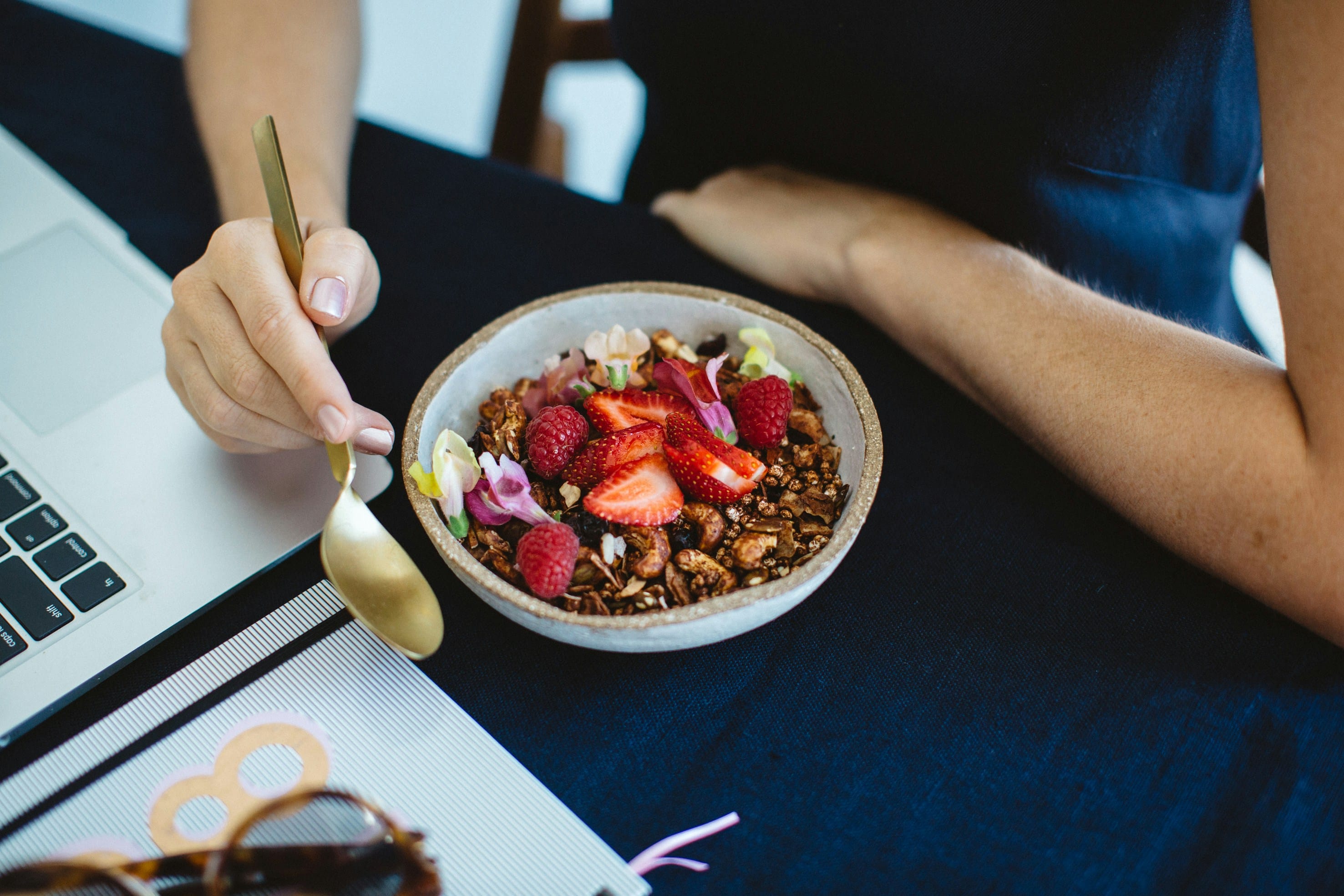If you’re in tune with the health and fitness industry, you’ll hear the phrase gut health repeated often. Why is this buzzword garnering tons of attention? Why is gut health so important?
Gut health refers to the balance of microorganisms that live in the digestive tract. There’s a delicate balance of essential microbes in the gut, and this balance is critical!
The spheres of modern life such as little sleep, eating processed high sugar foods, and even anxiety can upset your ‘gut feeling’ or, as the experts call it, the gut microbiome.
The optimum balance of these microorganisms is what ensures desirable physical health, mental health, and immunity.
A basic overview of the digestive process
Digestion works by passing food through the GI (gastrointestinal) tract. It starts right when you chew the first morsel of food and ends in the small intestine.
As the food passes through the GI tract, blending takes place- food passing through with essential digestive juices, causing huge molecules of food to disintegrate into smaller bits or molecules.
The body then imbibes these smaller molecules through the thin walls of the small intestine into the bloodstream.
Your blood performs the function of delivering nutrition to the rest of the body, leaving the waste products of the digestion process which passes through the large intestine and then out of your body as a solid matter (stool).
Importance of gut health
When your gut health isn’t right, bloating, diarrhea, stomach pain for no reason, and many other conditions can occur, seemingly out of nowhere. When a person’s microbiome is thrown out of function, he or she can suffer from physical problems.
Inflammatory bowel diseases (IBD’s) like Crohn’s disease can affect any area of the gastrointestinal tract, from the mouth to the anus, either in continuity or as isolated areas. If these diseases permeate the intestines, it can impair GI function.
Even anxiety and depression put GI impairment into effect. The functionality of a person’s gut is directly proportional to the diversity of the gut microbiome.
Gut microbes
Gut microbes are a collection of bacteria, viruses, fungi and other microorganisms, which contrary to popular belief based on stigmas, are actually good for keeping your gut happy. Common examples include lactobacillus and bifidobacterium, which have a pronounced probiotic function.
Out of all these microscopic living things, bacteria are the most vastly studied. There are more bacteria in your body than cells!
Hence, foods promoting the growth of these beneficial microbiota are the key for a healthy gut. The more diverse your gut microbiome is, the healthier your body will feel. Diversity comes from eating foods which contain a vast variety of bacteria with many of them, specifically healing the body by performing various functions.

Get Your Free Guide to the Top 50 Anti-Inflammatory Foods
Foods To Avoid
Artificial sweeteners
Artificial sweeteners contribute to metabolic abnormalities and dysbiosis, an imbalance of the ecosystem. Artificial sweeteners alter the composition and function of the gut microbiome to promote glucose intolerance, which can contribute to disease states.
Animal Products
Animal products reduce the growth of healthy bacteria and enhance the growth of “bad” bacteria linked to chronic disease.
Unhealthy Fats
Avoid fried foods, added butter, and processed oils in your leaky gut diet for optimal health. There are several healthy cooking oil swaps that can be implemented in all kinds of recipes, from healthy sweet treats to salads. Most plant foods are also naturally low in fat.
Unnecessary NSAIDS
Nonsteroidal anti-inflammatory drugs (NSAIDs) such as Advil and aspirin, alter the composition of the gut microbiome and contribute to leaky gut. Leaky gut is a condition in which gaps in the intestinal walls may widen, allowing bacteria, toxins and undigested food particles to pass through the intestinal walls into your bloodstream.
How to Promote Good Gut Health
Although our body isn’t fit to digest fiber, the gut microorganisms play a major role in its digestion.
Fermented foods which are already altered by microorganisms contain bacteria such as lactobacilli. These bacteria are a good addition to any leaky gut healing diet.
Fiber
High-fiber foods feed the healthy bacteria that improve immune function, reduce inflammation and chronic disease, and even help regulate mood.
Prebiotics
There’s a difference between prebiotics and probiotics. Prebiotic fiber is non-living and goes through the small intestine undigested. It’s fermented when it reaches the large colon.
Prebiotics are found in many fruits and vegetables, especially those that contain complex carbohydrates, such as fiber and resistant starch.
Prebiotics work wonders to enhance the growth of these beneficial microorganisms. Prebiotics are quite tough for the human body to break down into smaller molecules. However, they breakable by certain species of bacteria and are used for metabolic activities of the body later on.
All in all, foods which provide us with a wider variety of bacteria work the best in a leaky gut healing diet.
Whole grains
Several studies have been conducted to observe how gut microbes respond to the consumption of whole grains. Based on what research has demonstrated to date, it seems likely that eating whole grains beneficially impacts the microbial profile of the gut. For example, several studies have demonstrated that consuming whole grain breakfast cereal, whole grain barley, and brown rice increases the abundance of bifidobacteria and lactobacilli, as well as specific types of bacteria thought to have beneficial effects, like roseburia and eubacterium rectale.
On the flip side, eating a diet low in whole grains is associated with gut dysbiosis, which formally means “the condition of having imbalances in the microbial communities either in or on the body” and informally means that our microbes are not doing so hot at maintaining gut health.
Whole grains are a source of many vitamins and also improves conditions for deficiency symptoms like loss of appetite, retarded growth, and many more. Its intake results in lesser chances of heart diseases. Whole grains are broken down in the large intestine instead of the small intestine, and promote the growth of good bacteria.
10 Foods For Improved Gut Health
Knowing the correct supplements is a must, especially when our food intake decides which kind of microorganisms thrive in our body. Here are 10 foods which can heal leaky gut and be a boon for your gut health.
Miso
Miso means fermented beans in Japanese. It is made from fermented soybeans and contains billions of beneficial bacteria. In Japan, many people still begin their day with a hearty bowl of miso soup to stimulate digestion and energize the body.
Miso is quite rich in essential minerals and a great source of vitamins (B, E, and K) and folic acid. It also adds the fifth element of taste (umami) to dishes like soups, broths, stews, and marinades.
Oryzae is the most important probiotic strain found in miso. Research shows that the probiotics in this condiment may help reduce symptoms linked to digestive problems, including inflammatory bowel disease (IBD).
Plant-based metabolic enzymes and probiotics, which are abundantly found in miso, can survive the journey through your intestines. They have a higher heat resistance than animal-based probiotics like the ones in most yogurts.
There’s no wonder that this Japanese superfood is highly recommended as part of a leaky gut healing diet.
Kimchi
Kimchi is a traditional Korean dish made by lacto-fermentation, which is also responsible for other fermented delicacies like sauerkraut (more on that later!). In the primary stage, cabbage is soaked in a salty brine that eliminates harmful bacteria.
In the next step, the surviving Lactobacillus bacteria (good bacteria) mentioned earlier as well, convert sugars into lactic acid, which preserves the vegetables and imparts flavor.
Gut-friendly bacteria can allow the production of chemicals called short-chain fatty acids, which improves the immune system by keeping it balanced.
Fruits
Gut bacteria need a stable and friendly environment in which to thrive. The ideal pH in the human colon is between 6.7 and 6.9. To sustain good bacteria and to prevent harmful bacteria from flourishing, the colon needs to be slightly acidic.
One of the easiest ways to maintain a desirable pH balance is to eat fruits high in fiber. The following fruits are highly effective:
Bananas:
Bananas are highly rich in soluble fiber. They also contain a prebiotic compound that passes through the upper part of the gastrointestinal tract and remains undigested. Only when they pass through the small intestine, they reach the colon where they are fermented by the gut microflora.
Bananas maintain harmony among microbes in your intestinal ecosystem.
Raspberries:
Raspberries are full of soluble fiber. The high fiber and water content in raspberries help prevent constipation and maintain a healthy digestive tract.
Pears:
When it comes to our GI health, pears are fiber-dense fruits, and their skin is particularly beneficial. They contain at least three to four times as many phenolic phytonutrients as the flesh. These phytonutrients include antioxidants, anti-inflammatory flavonoids, and anti-carcinogenic phytonutrients, like cinnamic acids.
Apple:
Apart from the other health benefits that apples are known for, intake of apples significantly alters amounts of two bacteria (clostridiales and bacteroides) in the large intestine. The balance of these bacteria has a significant impact on your metabolism.
Kiwi:
The fiber in kiwi binds and removes toxins from the colon, which is beneficial in preventing colon cancer. They are also dense with nutrients like proteins with almost negligible fat value.
Blueberries:
Keeping aside all the mouth-watering pies this fruit yields by its mere presence, blueberries are a major source of the bifidobacteria, which improves gut health. It has an important role in the process of digestion and is an abundant supply of the prebiotics contributing to the healthy bacteria in the gut and colon. No doubt, this one proves to be an essential part of the healthy gut food chart.
Sauerkraut
Sauerkraut (sour cabbage) is a German delicacy made from finely cut raw cabbage that has been fermented by various lactic acid bacteria. It has an enduring shelf life and a distinctive sour flavor.
A pilot study found that regularly eating sauerkraut can help reduce symptoms of the annoying Irritable Bowel Syndrome (IBS). It has also been noticed to cause a spike in good bacteria.
Sauerkraut contains dietary fiber which aids digestion, optimizes blood sugar, and may even help lower cholesterol. It contains far more lactobacillus than yogurt, making it a better probiotic.
A serving or two of sauerkraut every few days may help treat ulcerative colitis and irritable bowel syndrome.
Tempeh
Tempeh is a traditional Indonesian fermented soy product that’s a popular vegetarian meat replacement. Tempeh is high in protein, prebiotics, and a wide array of vitamins and minerals.
Some studies have linked prebiotic intake with increased stool frequency, reduced inflammation, and improved memory. There’s also evidence to show that drinking tempeh causes beneficial changes in the gut microbiota, the bacteria that reside in your digestive system.
Kefir
Kefir is a healthy drink which originated in Eastern Europe and Russia. Traditionally, kefir is fermented at ambient temperatures overnight. Active fermentation of lactose yields a sour, carbonated, slightly alcoholic beverage. It is an effective antibiotic and helps with a lot of digestive system disorders.
It has a consistency and taste similar to drinkable yogurt, similar to lassi in India. However, like sauerkraut, it proves to be a more powerful probiotic than yogurt. Kefir can contain up to 30 strains of beneficial bacteria and yeasts. Some of the major strains include the lactobacillales – or lactic acid bacteria, which is a good bacteria for our gut.
Broccoli
Broccoli, a nutritious cruciferous vegetable, is a member of the cabbage family. The cruciferous family of vegetables also includes cauliflower, brussel’s sprouts, arugula, bok choy, cabbage, kale, collard greens, cress, radishes, turnips, and kohlrabi.
Eating broccoli can help reduce inflammation in the colon and may decrease the incidence of colon cancer, among other cancers. It is also a source of folic acid which increases the appetite. With its relatively mild flavor, versatility, and affordability, broccoli provides an accessible and delicious way to give your body a brassica boost.
Dandelion Greens
Dandelion greens were historically used to purify the blood, address digestion-related problems, and prevent piles and gallstones. Dandelion greens are rich in inulin and pectin, which are soluble fibers that may help your body feel full longer and assist with weight control.
They might taste slightly bitter, so consider sautéing them with onions, drinking them with tea, or adding them to soups and salads.
Seaweed
Seaweed is high in fiber [25–75% ]. This is higher than the fiber content of most fruits and vegetables.
Apart from its contribution to gut health, seaweed contains iodine and tyrosine, which support the thyroid function in our body and repair the damaged cells due to its unique calibre to absorb concentrated amounts of iodine from the ocean.
Flaxseed
Research on flaxseeds suggests that fermentation of flaxseed fibers in the gut changes the microbiota to improve metabolic health and protect against diet-induced obesity.
The American journal of physiology focused on flaxseed’s beneficial properties:
“Our data suggest that flaxseed fiber supplementation affects host metabolism by increasing energy expenditure and reducing obesity as well as by improving glucose tolerance. Future research should be directed to understand the relative contribution of the different microbes and delineate underlying mechanisms for how flaxseed fibers affect host metabolism.”
Incorporating Healthy Foods is the Key to Optimal Gastrointestinal Function
Our body is home to a trillion bacterial species, which form the human microbiome. Each microbiome is unique in its own way, leading to a variety of mix microbiomes, each benefiting its human body.
Cleaning up your diet is the most powerful way to cancel the bad bacteria and embrace the good guys.
These good bacteria do a lot for you— they digest your food, keep your immune system safe and sound, act as soldiers when infectious agents attack you, keep the toxic stuff away, and produce the vitamins and nutrients needed for human nutrition. From feeling anxious or happy to the disorders of the digestive system such as diarrhea or heart disease, your gut feeling truly decides your health.
Interested in learning about gut health, nutrition, and fitness certifications?
- Gut Health Certification
- Health Coach Certification
- Holistic Health Coach Certification
- Holistic Nutrition Certification
- Personal Trainer Certification
- Pre and Post Natal Fitness Certification
- Sports Nutrition Certification




